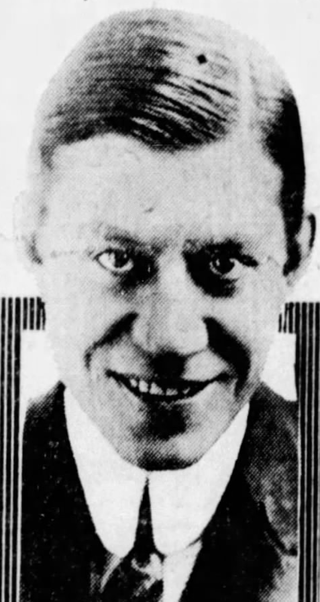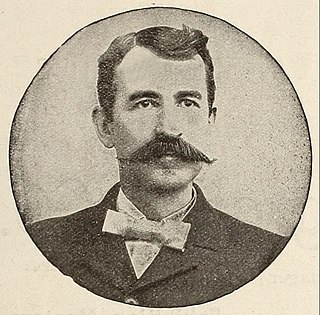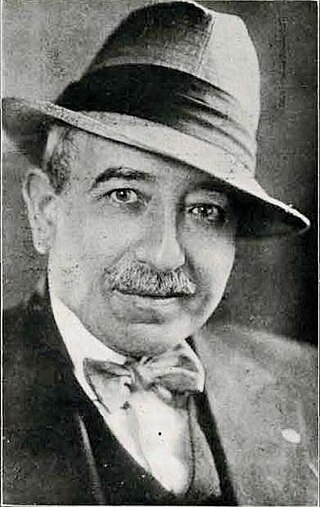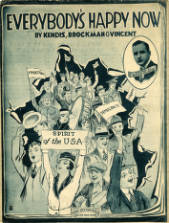Related Research Articles

Geoffrey O'Hara was a Canadian American composer, singer and music professor.

George Gard "Buddy" DeSylva was an American songwriter, film producer and record executive. He wrote or co-wrote many popular songs, and along with Johnny Mercer and Glenn Wallichs, he co-founded Capitol Records.

Egbert Anson Van Alstyne was an American songwriter and pianist. Van Alstyne was the composer of a number of popular and ragtime tunes of the early 20th century.

Charles Theodore "Charley" Straight was an American pianist, bandleader and composer.
James Brockman was an American songwriter. Born in Russia, he emigrated to New York by himself at the age of 9 or 10. His given name was Jacob Brachman but he changed the spelling of the last name because it was mis-pronounced and the rest of the family followed with the change.
Ballard MacDonald was an American lyricist, who was one of the writers of Tin Pan Alley.

Edward Taylor Paull was a minor American composer, arranger, and sheet music publisher.

"Down Among the Sheltering Palms" is a popular song.

Leopold Feist, in 1897 founded and ran a music publishing firm bearing his name. In the 1920s, at the height of the golden age of popular music, his firm was among the seven largest publishers of popular music in the world. Leo Feist, Inc., ran until 1934. The company used the motto "You can't go wrong, with any FEIST Song."
Irving Bibo was an American composer, songwriter, and publisher.
Frank Henri Klickmann, was a composer, songwriter, musician, and arranger of music from the 1900s to the 1940s. He composed over a hundred songs, such as "Knockout Drops" (1910), "Dynamite Rag" (1913), "Sing Me the Rosary" (1913), "The Squirrel Rag" (1913), "Hysterics Rag" (1914) and "Sweet Hawaiian Moonlight" (1918). During the 1920s, he was employed by Jack Mills Music, Inc. Orchestral arrangements from this time include "The Vamp", "Walkin' the Dog", "Don't You Remember the Time?", and "Kitten on the Keys".
Clarence Gaskill was an American composer and lyricist active during the 1920s to early 1930s. His most well-known songs include, Doo-Wacka-Doo (1921). I Can't Believe That You're in Love with Me (1926), and Prisoner of Love (1932). His first hit came in 1919 with I Love You Just the Same, Sweet Adeline.
"A Soldier Speaks" is a song from 1944, with music and lyrics by Peter DeRose, and published by Robbins Music Corp.

Everybody's Happy Now is a World War I song written by James Kendis, James Brockman, and Nat Vincent in 1918. It was published by Kendis-Brockman Music Co. and written for voice and piano.

"Lucky Lindy!" is a fox-trot song composed by Abel Baer, with lyrics by L. Wolfe Gilbert. It was published by Harmony in 1927. The song was the first to celebrate Charles Lindbergh's transatlantic flight in the Spirit of St. Louis and his landing in Paris. Hundreds more followed.
"We're Going Over the Top" is a World War I song written by Andrew B. Sterling, Bernie Grossman, and Arthur Lange. It was published in 1917 by Joe Morris Music Co., in New York, NY. The sheet music cover, designed by Starmer, illustrates a battlefield scene with a tank moving over the top of a trench and soldiers inside the trench getting out of the way of the tank. Behind the tank soldiers march up the field.

"The Dream of a Soldier Boy" is a World War I song written by Al Dubin and composed by James V. Monaco. It was published in 1917 by Witmark & Sons in New York City. The sheet music cover depicts a photo of a soldier embracing his mother while a proud father and others look on.
Oh, Charlie is My Darling is a song by Irving Bibo from 1927 and was published by Bibo, Boedon & Lang.

Swanee Shore: is a song composed by Sidney D. Mitchell, Arthur Fields and Irving Kaufman in 1919 and published by Leo Feist Inc.
Lou Davis was an American songwriter, and author associated with Tin Pan Alley. He was also a businessman in the wholesale meat business. His primary musical collaborators were Abel Baer, Henry Busse, Harold Arlen, Henry Lange, and J. Fred Coots. Several of his most notable songs include "Hot Lips", "A Precious Little Thing Called Love", "Deep in the Arms of Love", "Here Comes My Ball and Chain", and "I'm Croonin' a Tune About June".
References
- 1 2 "Mary Earl".
- ↑ "Mary Earl i.e., Robert King". Library of Congress .
- ↑ "WOMEN IN AMERICAN MUSIC, PAGE 2".
- ↑ WALSH, THOMAS P. (2013). Tin Pan Alley and the Philippines American Songs of War And Love, 1898-1946. Scarecrow Press Inc. p. 245. ISBN 978-0810886087.
- ↑ Vogel, Frederick G. (1995). World War I Songs: A History and Dictionary of Popular American Patriotic Tunes with Over 300 Complete Lyrics. Jefferson, North Carolina: McFarland & Company, Inc. p. 51. ISBN 0899509525.
- ↑ Jasen, David A. (1988). Tin Pan Alley: the Composers, the Songs, the Performers, and their Times. New York: Donald I. Fine, INc. pp. 35, 304. ISBN 1556110995.
- 1 2 3 4 5 6 7 8 9 10 11 12 13 14 15 16 17 18 19 20 21 22 23 "Robert King (composer) - Discography of American Historical Recordings". adp.library.ucsb.edu.
- ↑ Marcuse, Maxwell F. (1959). Tin Pan Alley in gaslight;a saga of the songs that made the gray nineties "gay.". Watkins Glen, N.Y.: Century House. p. 60. hdl:2027/uc1.31822013278122.
- ↑ Studwell, William E. (William Emmett) (1997). The Americana song reader. New York: Haworth Press. p. 122. ISBN 978-0-7890-0150-4 . Retrieved 2021-03-01.
- ↑ Jasen, David A. (1988). Tin Pan Alley: the Composers, the Songs, the Performers, and their Times. New York: Donald I. Fine, Inc. p. 35. ISBN 1556110995.
- ↑ "Robert A. King". IMDb.
- 1 2 3 4 5 6 Jansen, David A. (2004). Tin Pan Alley: An Encyclopedia of the Golden Age of American Song. Routledge. p. 138. ISBN 1135949018 . Retrieved 17 December 2018.
- ↑ Jasen, David A. (1988). Tin Pan Alley: the Composers, the Songs, the Performers and their Times. New York: Donald I. Fine. p. 111. ISBN 1556110995.
- ↑ "Lafayette: (we hear you calling). - Pritzker Military Museum & Library - Chicago". www.pritzkermilitary.org.
- ↑ "Lafayette: (we hear you calling) - Pritzker Military Museum & Library - Chicago". www.pritzkermilitary.org.